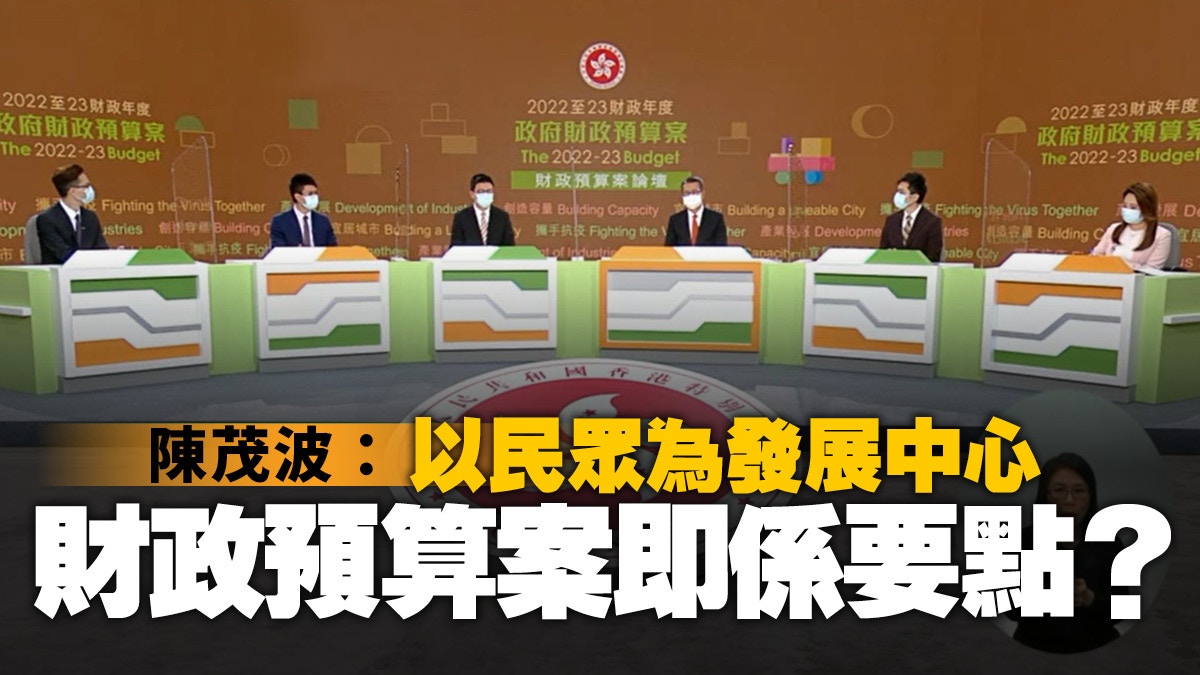Last Wednesday (February 23), Financial Secretary Paul Chan released the 2022/23 Budget, which revised last year's budget deficit of $101.6 billion to a surplus of $18.9 billion, and set the total public expenditure for the coming year at $851.8 billion Yuan.
One of the subtopics of his speech was "Putting the people at the center of development", claiming that "economic development is to improve the living standards of all citizens, so that everyone can share the fruits of development. This is also the foundation of social harmony." It is necessary to enrich industrial development and create more high-quality jobs, so as to benefit the public and solve deep-seated problems such as housing and poverty. In the conclusion, he reiterated that "These problems are related to the harmony and stability of Hong Kong society in the long run, but there is no overnight solution. , the whole society must work together to solve it.”
Although Chen Maobo has put forward a good financial management philosophy, but looking at the specific policies listed in the Budget, they have not been able to help Hong Kong create conditions and provide resources to solve deep-seated problems as he said.
Because the promotion of industrial development has not changed the way of relying on appropriation funds alone, and the promotion of social security is mainly based on short-term "sugar distribution" measures, and the public finance reforms mentioned in the past two years have not made much progress. Therefore, the current government's last proposal The performance of the Budget in these aspects can only be said to be barely passable and mediocre at best.
Financial Secretary Paul Chan read out the 2022/23 Budget.
(Information Services Department)
The development of the industry emphasizes deep cultivation and management
It is by no means impossible for the Budget to implement the vision put forward by Chen Maobo and truly "put the people at the center of development". "Hong Kong 01" has proposed a series of fundamental reforms to achieve "common prosperity".
First of all, in terms of promoting industrial development, officials of the Hong Kong government have proposed the development of six emerging advantageous industries: cultural creativity, medical and health care, private education, innovation and technology, testing and certification, and environmental protection more than ten years ago. Still only about 10%, the number of jobs provided has been stagnant and even shrinking in recent years.
In his speech on the Budget, Chen Maobo had to admit that under the splendid economic figures of Hong Kong, there is a problem of "unbalanced economic development and many young people fail to realize their aspirations". It seems that there is no way to continue the funding and injection of funds, and mistakenly think that this can replace the deep ploughing work of developing the industry.
It is not difficult to see from the current allocation amount, investment focus and review mechanism of various relevant funds that these projects, which are nominally intended to support industrial development, have to some extent the consideration of pursuing profit returns as soon as possible from a financial perspective.
This kind of thinking is understandable as an investor, but it will inevitably restrict their effectiveness in supporting local industries, resulting in the failure of their funding targets and application methods to meet the development needs of the industry.
For example, companies supported by the Innovation and Technology Fund rarely stay in Hong Kong to industrialize and set up production chains. Even the "Cantonese Opera Development Fund" has been criticized by famous actors in the industry.
In the future, the fund operation and funding model should listen carefully to the voice of the industry, and should also increase risk-taking to help more young people set up start-ups, and even consider giving priority to supporting the objects selected for industrialization in real estate.
Start tax reform consultation now
At the same time, we must admit that the Budgets of the SAR Government in recent years are not entirely lackluster.
Whether it was the increase in the stock stamp duty rate last year or the introduction of a progressive rate system for residential properties this year, it shows that Hong Kong rulers are gradually willing to implement these public financial arrangements that reflect the principle of "more pay if you can".
It is a pity that the relevant measures are more like being forced by the government spending in the past few years to cope with social unrest, international changes and the increase in government spending due to the new crown epidemic, not the officials in charge sincerely accept them.
Regarding the more long-term and broad tax reform, Chen Maobo has proposed to find new growth points and increase government revenue since the previous year. Refers to "it is still not appropriate to adjust the profits tax and salaries tax rates for the time being".
The Government should further expand the tax base of Hong Kong in accordance with the principle of "capacity pays more".
(Photo by Liang Pengwei)
In order to make Hong Kong's financial structure more stable, but not to drag down the quality of public services, "Hong Kong 01" believes that it is imperative to restart the tax reform.
At the beginning of the year, the IMF delegation conducted an assessment of Hong Kong's economic development, and its report bluntly stated that "in order to cope with the rapidly aging population and the expected increase in spending pressure, the government should consider comprehensive tax reform if it is to maintain fiscal sustainability", and It is proposed to increase the progressiveness of personal income tax, introduce capital gains tax and tax on dividends.
In addition, the budget result for the last fiscal year was revised from a deficit to a surplus because the profits tax revenue was larger than expected, which also shows that it also has room for progressive expansion.
The Budget and Tax Policy Unit under the Secretary-General's Office needs to restart tax reform consultation to explore options such as progressive profits tax, capital gains tax, property vacancy tax, etc., and further expand Hong Kong's tax base in accordance with the principle of "capacity pays more".
Preparing for Universal Retirement Social Security
After increasing the inventory, it will be on the agenda to gradually expand the security system to benefit the whole people.
At present, due to the need for relief during the epidemic, the new Budget follows the practice of "giving sugar" last year, and provides an additional half-month standard CSSA, Old Age Allowance, Old Age Living Allowance, Disability Allowance and Working Family Allowance. There has been no more active attempt to expand the social safety net on a regular basis.
Taking retirement security as an example, the Chief Executive proposed to combine the ordinary and high-level long-term benefits in a unified manner the year before. The Budget has increased the related expenditure of the Social Welfare Department by about 6.6 billion yuan in the coming year. Said that the progress of the merger between the two will be monitored in the next year, but in the video conference held by the Finance Committee of the Legislative Council last Friday (February 25), the officials of the government have not been able to explain the exact timetable, which has attracted a congressman to question the bureau. Fang is continuing to delay.
Moreover, even if the merger of Changshengjin can slightly increase the number of beneficiaries and the financial burden of social welfare, this move cannot remove the strict review threshold in the past, and it is quite far from the requirements of all parties in the society for universal retirement protection that conforms to the principle of fair distribution.
As the "Hong Kong 01" has always advocated in the past, the government must take more responsibility for taking care of the overall social security. The best way is to start to reform the screening and review mechanism, prepare to establish an "old-age pension" jointly borne by employees, employers and the government, and at the same time The authorities themselves must also actively open sources and increase their income, so as to bring sustainable retirement protection to the public.
Hong Kong should share the economic gains more equitably.
(Associated Press)
Learning from the Mainland to Promote Common Prosperity
In fact, when Chen Maobo was preparing for the consultation work on the Budget in November last year, he wrote in his blog that there are several necessary elements in the future resource mobilization and utilization criteria, including "letting the public see, feel, and have the necessary elements". Projects that create a sense of gain” and “enable grassroots citizens to benefit more, work towards a more equitable sharing of economic results, and promote “common prosperity””, and then the driving force for economic growth and the resolution of deep-seated contradictions.
Judging from the final product, the whole speech of the new Budget no longer mentions the topic of "common prosperity", and the measures that may give the public a "sense of gain" are still limited to inflation-linked bonds (iBonds) and electronic products. Old tricks such as consumer coupons, coupled with the aforementioned deficiencies, inevitably make people feel that the Secretary is unable to turn the vision described at that time into reality.
Not long before the release of Hong Kong's Budget, the National Development and Reform Commission introduced the progress of supporting the high-quality development and construction of a "common prosperity" demonstration zone in Zhejiang Province. Local officials have already drafted a plan to expand the middle-income group within less than a year. We will work hard to create a pilot area for reform of the income distribution system, and provide various living, employment and entrepreneurial subsidies for young people in Zhejiang. This year, we will study and plan reform plans such as the social security system and the fiscal and tax policy system.
Officials of the SAR government need to continue to change their own understanding, from just calling for a few mainland slogans, to really highlighting this belief in their policies, so that "people first" and "common prosperity" are no longer politicians' beautiful words, but can be. Implemented as the government's policy motto.
Please pay attention to the 306th issue of "Hong Kong 01" e-Weekly Newsletter published on February 28, 2022. You can also
click here
to try out the weekly e-newsletter to read more in-depth reports.




/cloudfront-eu-central-1.images.arcpublishing.com/prisa/GOC4OMOSPRGHBC3AGTSKUSEWDY.jpg)






/cloudfront-eu-central-1.images.arcpublishing.com/prisa/KMEYMJKESBAZBE4MRBAM4TGHIQ.jpg)


/cloudfront-eu-central-1.images.arcpublishing.com/prisa/EXJQILQR5QI7OMVRTERD7AEZAU.jpg)
